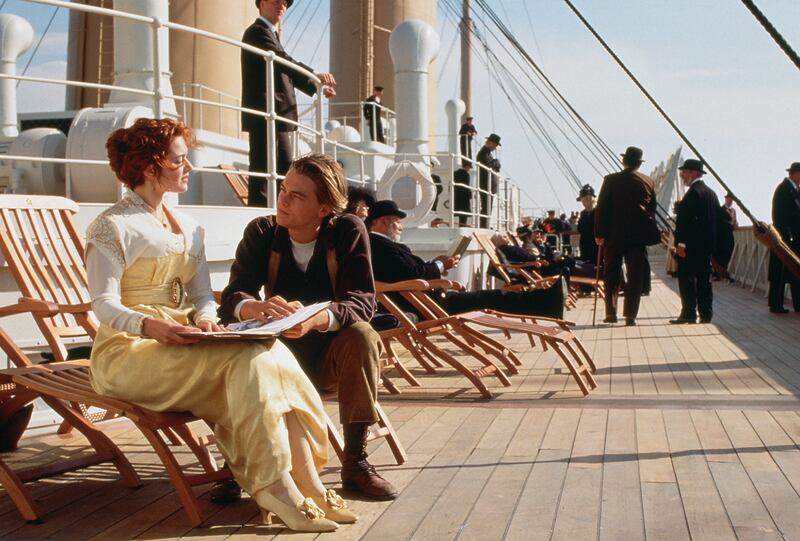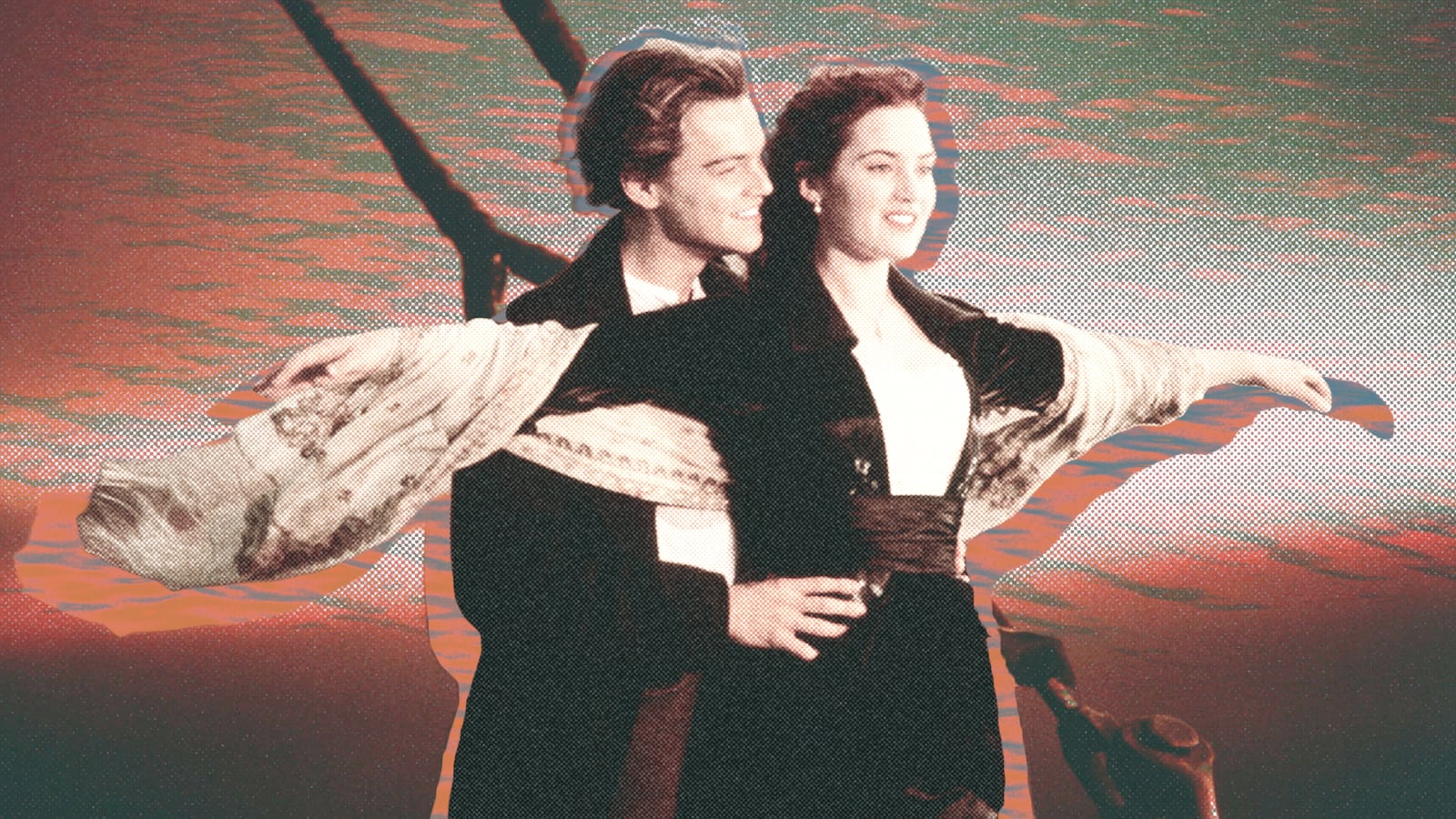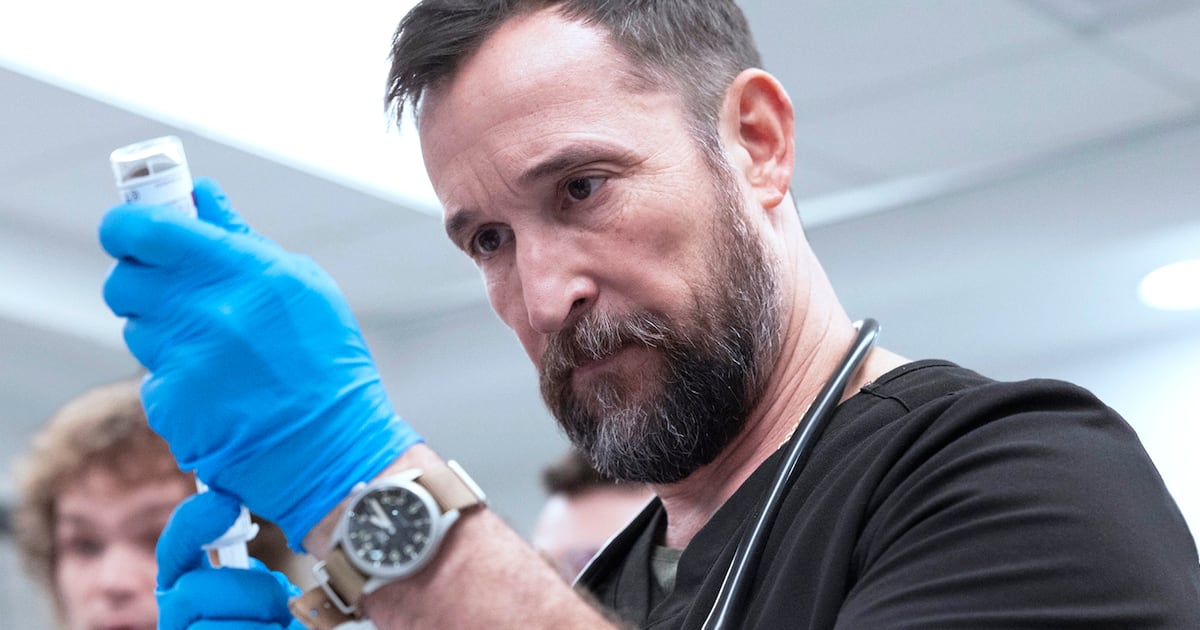As a teenager, I wouldn’t touch James Cameron’s Titanic with a 12-foot rescue hook. The late ’90s saw entire sections of my local Blockbuster given over to those sky-blue, double-wide VHS boxes—Leo’s windswept grin on CASSETTE ONE, Kate’s sultry lour on CASSETTE TWO, as if this singular film carried the cultural cachet of 80 others. I couldn’t believe that it did. So I used my powers of adolescent deduction and chose not to find out.
The aughts molded my misgivings into something like a soft boycott. I say “soft” because, if someone had simply sat me down and forced me to watch Titanic, I almost certainly would have, just as a high school bae “made” me watch Hilary Duff’s A Cinderella Story and Britney Spears’s Crossroads (no shame!). Titanic, in my wee little mind, was a bit like these movies, in that it was a soppy love story. I didn’t need soppy love stories in my life. Ergo, I didn’t need Titanic.
To process this sad state of affairs, you have to remember a few things about that time. First, Leonardo DiCaprio hadn’t turned into the household Leo! we know and love today. Nineties Leo was a bit like the Beatles before they went psychedelic: a mysterious, baby-faced phenom surrounded by so many screaming teens that you couldn’t hear the music. Kate Winslet, discovered not long before by Peter Jackson, had been messing around with Shakespearean adaptations. And James Cameron’s career—successful, not yet meteoric—could be chalked up to a few good decisions and a whole lot of Arnold Schwarzenegger.
With Titanic, these people were suddenly everywhere. Cable television, checkout line tabloids, the aforementioned video store. You couldn’t watch an hour of VH1 without the railing scene barging in. The film even transcended media format, with its soundtrack topping musical charts in more than 25 countries.
For contrarians like myself, the backlash came naturally. The more everyone fawned over DiWinsLeo (did I pull that off?), the less I wanted to do with them. Perhaps most dispiriting, two of my high school friends reenacted Celine Dion’s “My Heart Will Go On” every New Year’s Eve, hanging off the edge of whatever cat-clawed living room sofa we had on hand. Why would I want to spend three hours watching that?
Titanic returned to theaters this month for its buzzy 25th anniversary. Spoiler alert: I saw it. Furthermore, I absolutely loved it. Not only did Cameron’s epic trounce every last one of my childhood misconceptions, it also proved the antithesis of the modern-day blockbuster, cementing my belief that big-budget cinema has drifted too far from reality.
My Maiden Voyage
A lot can change in 25 years. When The Departed and Blood Diamond arrived in quick succession in 2006, I became a Leo convert. Kate endeared herself to me in Michel Gondry’s Eternal Sunshine of the Spotless Mind. James Cameron, uhm, went blue, and sullied himself by allowing the word “unobtanium” to remain in one of his scripts. Meanwhile three-hour movie runtimes, once the stuff of cinematic legend, are these days doled out to Edward Cullen moping around Gotham City.
Leo and Kate eventually stopped reminding me of Titanic. For that matter, I no longer thought about James Cameron’s Titanic at all, until I noticed its listing last weekend in a West Seattle theater.
“Are you f**king serious?” asked my girlfriend. “You’ve never seen Titanic?”
“I don’t think so,” I told her.
“Like, never never? But you must have. Literally everyone has.”
At this, I dredged the riverbed of my childhood memory. Yes, it did seem like a fair bit of Titanic footage was mixed up in there. I remembered the railing scene, and slick-haired Leo in a tux, and passengers flopping around in frigid water. Had I seen Titanic and simply forgotten about it?
As it turned out, no. I really hadn’t. Like so much of the film’s script—“Jack, I want you to draw me like one of your French girls”—these clips simply pervaded common culture. When the movie opened with a present-day salvaging vessel (wut) and Bill Paxton’s gold hoop earring (double wut), I took a deep breath and prepared to be entertained.
And holy cow, was I ever entertained. Twenty-five years late to the party, I loved every minute of Titanic. I loved Leo’s lippy grin and Kate’s fiery independence. I loved Billy Zane’s plummeting eyebrow and Frances Fisher’s motherly spite and Victor Garber’s noble downfall. But what I loved most, even more than Leo honking the horn on that 1912 Coupé de Ville, was the film’s sheer audacity, the fact that Hollywood funneled so much capital into portraying an actual historical event.

The Ship of Dreams
Though I’ve grown older, I can still hold a grudge, and these days reserve my “soft boycotting” for the indomitable MCU. It’s not that I don’t enjoy special effects, or appreciate some of the actors on hand. But as a novelist, someone with a passing interest in how humans behave, I value real-life stories and real-life stakes—and I think cinematic audiences should, too.
It’s no secret that our world is undergoing some sort of vast, undignified empathy drain. At the same time, our ascendent entertainment— by every number in the book—involves impossible things happening to unbreakable people. Check out that magician’s rambunctiously self-aware cloak! Hey—what’s a racoon doing on this starship? Ants… ants!? You’re telling me Paul Rudd didn’t make enough money from the Anchorman sequel?
Trust me: I’m a fellow escapist. My bookshelves are loaded down with high fantasy. So I kind of get the superhero thing. I might even want to get it. Alas, economic magnitudes separate paperback fantasy authors from the MCU entertainment behemoth, and I’ve consistently found frustration, not escape, in the hands of our cinematized superheroes.
Leo and Kate aren’t portraying real historical figures in Titanic, but we can generally imagine their story as it happened. Leo, down on his luck after some sort of streetwise MFA program, strikes gold in a winning hand of poker. Good for him! Kate, thrust into a relationship of circumstance, is expected to conform to both familial and societal expectations. We empathize with her, just like we empathize with shipbuilder Thomas Andrews (Garber), who would rather sink with his prized project than live with its failure.
I don’t know what it’s like to get bitten by a radioactive spider, or to receive a “top-secret super soldier serum.” But I’ve swum in cold water. I’ve been in love. Maybe not so intensely and all at the same time, but, anyway, what I’m trying to say it that Titanic touches us because of its realness. Actual babies were made on the Titanic! You can visit certain museums and run your hands along bits of the ship’s salvaged hull. The thing itself is still down there deteriorating at the bottom of the sea, looking more and more like Bill Nighy in Pirates of the Caribbean—and if that doesn’t give you the chills, I don’t know what will.
I’ll Never Let Go
Not unlike the steady, irreversible flooding of the Titanic’s bow compartments, the blockbuster’s splendor washed over me in well-paced spoonfuls. Yet one particular moment saw me fall wholly into its thrall. Perhaps an hour into the film, Captain Edward Smith (Bernard Hill) ambles up to the helm and says, “Take her to sea, Mr. Murdoch. Let’s stretch her legs.”
“All ahead full!” comes the cry.
Now we’re transported beneath decks to the ship’s engine room, where sequoia-sized pistons rise, roll, and plunge with terrifying force. Gauges spin. Wheel valves crank. Steam explodes from pressurized cavities. Before viewers can acclimate themselves to the spectacle, we descend even lower, to the soot-choked boilers and their hellish labor.
If not for this magnificent sequence, it would be easy to forget that everything happening up on the first-class deck is being powered by fifty sweat-soaked Irishmen down below. These coal-shoveling stokers lay bare the human scale of Titanic. Life, they remind us, can be freaking miserable. For all that Leo suffers in this film, his hardship seems petty compared to even a few hours working the fuel compartments.
Staring wide-eyed at the boiler room scene, I reflected with horror at the very real price that some people have paid—and still do pay—to come to America. As I found myself thinking about that, I realized that Titanic is so much more than a soppy love story. Its’ a parable for our times, a reflection on class, industry, and arrogance.
Most of all, it’s relatable. And that makes Titanic a really, really good movie.
Keep obsessing! Sign up for the Daily Beast’s Obsessed newsletter and follow us on Facebook, Twitter, Instagram and TikTok.







